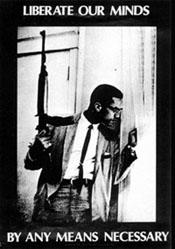
By any means necessary is a translation of a phrase used by Martinican intellectual Frantz Fanon in his 1960 Address to the Accra Positive Action Conference, "Why we use violence". The phrase had also been used by French intellectual Jean-Paul Sartre in his play Dirty Hands in 1948. Later, it entered the popular civil rights culture through a speech given by Malcolm X at the Organization of Afro-American Unity founding rally on June 28, 1964. It is generally considered to leave open all available tactics for the desired ends, including violence.
Frantz Fanon
The phrase is a translation of a sentence used in revolutionary psychiatrist and philosopher Frantz Fanon's 1960 Address to the Accra Positive Action Conference, "Why we use violence":
Violence in everyday behaviour, violence against the past that is emptied of all substance, violence against the future, for the colonial regime presents itself as necessarily eternal. We see, therefore, that the colonized people, caught in a web of a three-dimensional violence, a meeting point of multiple, diverse, repeated, cumulative violences, are soon logically confronted by the problem of ending the colonial regime by any means necessary. —Frantz Fanon, Alienation and Freedom: part 3, chapter 22, "Why we use violence". 1960[1]
Jean-Paul Sartre
The phrase is a translation of a sentence used in French intellectual Jean-Paul Sartre's play Dirty Hands:
I was not the one to invent lies: they were created in a society divided by class and each of us inherited lies when we were born. It is not by refusing to lie that we will abolish lies: it is by eradicating class by any means necessary.
— Jean-Paul Sartre, Dirty Hands: act 5, scene 3. 1963[2]
Malcolm X
It entered the popular culture through a speech given by Malcolm X in the last year of his life.
We declare our right on this earth to be a man, to be a human being, to be respected as a human being, to be given the rights of a human being in this society, on this earth, in this day, which we intend to bring into existence by any means necessary.
— Malcolm X, 1965[3]
Mandela recusal
In the final scene of the 1992 movie Malcolm X, Nelson Mandela—then recently released after 27 years of political imprisonment—appears as a schoolteacher in a Soweto classroom.[4][5] Yet Mandela informed director Spike Lee that he could not utter the famous final phrase "by any means necessary" on camera; fearing that the apartheid government would use it against him if he did. Lee obliged, and the final seconds of the film feature black-and-white footage of Malcolm X himself delivering the phrase.[5]
See also
- The end justifies the means
- By hook or by crook
References
- ^ Fanon, Frantz (2018). Alienation and Freedom. London: Bloomsbury. p. 654. ISBN 978-1-4742-5021-4.
- ^ "NUMBER: 48220". The Columbia World of Quotations. Archived from the original on 2007-02-10. Retrieved 2007-01-28.
- ^ Malcolm X (1992). By Any Means Necessary (Malcolm X Speeches & Writings). New York: Pathfinder Press. ISBN 0-87348-754-0.
- ^ Cunningham, Matthew (3 June 2004). "Creme cameos". The Guardian. Retrieved 2008-10-26.
- ^ a b Guerrero, Ed (1993). Framing Blackness: The African American Image in Film. Temple University Press. p. 202. ISBN 1-56639-126-1.